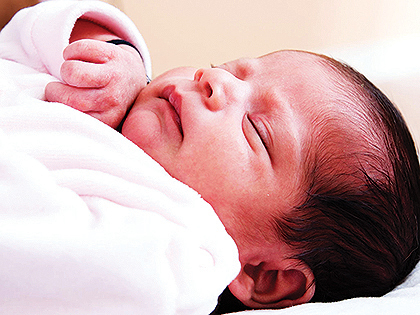Neonatal screening can help diagnose metabolic disorders in infants and ensure timely treatment. Doctors feel policymakers should make it mandatory
One in every 1,000 newborn babies has Inborn Errors of Metabolism (IEM) or other disorders that can be detected at birth by screening. IEM are rare genetic (inherited) disorders in which the body cannot properly turn food into energy. Tests can identify some of these disorders. But most newborn babies in India never undergo such a test for one of more than 50 known metabolic disorders because there is no mandatory newborn screening (NBS) program.
NBS is a medical procedure where a baby is screened within 72 hours of birth. It involves drawing a little blood from the baby’s heel. Doctors suggest it to parents if they suspect any abnormality. The idea is to perform the tests and detect diseases, if any, at the earliest stage possible so that the necessary treatment can be provided at the very outset of the disease.
Dr Madhulika Kabra, Professor at AIIMS’ Division of Genetics, Department of Paediatrics says that congenital heart screening for newborns and screening for biochemical disorders is an important public health measure that needs the attention of policymakers over the coming years. It can reduce infant mortality and morbidity drastically.
Currently, there is no NBS in government hospitals. There are a few private institutions screening for congenital hypothyroidism. Though systematic neonatal screening for congenital hypothyroidism was introduced in the early 1970s in many countries, in India, an estimated 10,000 babies are born with congenital hypothyroidism (inadequate thyroid production) every year; yet there is no screening programme for it.
NBS for common metabolic and genetic disorders could be an integral part of neonatal care as early detection and treatment can help prevent intellectual and physical defects and life-threatening illnesses. Based on the prevalence of the condition and available resources, the list of conditions for which screening is carried out differs from country to country. Universal screening for about 40-50 metabolic disorders is mandatory in US, Europe and many other countries across the world.
In India, the main reasons for the absence of NBS are lack of awareness, absence of a government programme and high costs. India aims to control infant mortality and morbidity due to infections and genetic conditions. Despite that, it has failed to introduce such a programme.
WHO recommends that genetic services should be introduced in countries with an infant mortality rate (IMR) less than 50. India has an IMR of 40. The Indian Academy of Paediatrics strongly advocates inclusion of NBS in our public health policy and holds that it will offer its technical and logistic inputs to the government for initiating this programme.
Paediatrician Dr Jaspal Singh says, “In many countries, hospitals have made these tests mandatory but it is sad that in India there is no government funded neonatal screening centre. If parents want to get their child tested, it always comes at an extra financial cost. Another problem is that there is hardly any awareness about these tests in India. Only a few hospitals in metropolitan cities like Delhi, Mumbai and Bangalore perform these tests, for which the expense may range from Rs 2,500 to Rs 6,500.”
“The government should seriously consider the introduction of newborn screening. It should be determined what disorders should be screened and how to raise infrastructure for the same. Newborn screening is the need of the hour in India,” he adds.
“Apart from the lack of a national NBS initiative—or more likely because of it—there is a significant educational gap between what could be and what actually passes for newborn screening in India,” says Dr Linh Hoang, Vice President of Neonatal Screening at PerkinElmer, a diagnostic corporation. “Identifying metabolic disorders is a one-time cost that would facilitate effective management of the disease and often leads to healthy, disability-free lives,” Hoang adds.
According to World Health Organ-ization (WHO), 140 million children are born every year and 5 million die in the first month of life in developing countries. Four per cent of the population in India are mentally retarded and 5-15% of sick newborns are thought to have a metabolic problem. Mass screening will be useful to prevent disability and death by early intervention, follow-up and counselling.
Doctors in the Capital recently pitched for mandatory NBS in the country, stating that IEM can be cured if diagnosed early. “As compared to the 90% children in China who go through newborn screening, the number is just 2% in India,” Dr Seema Kapoor, Division of Genetics in the Department of Paediatrics at Lok Nayak Hospital, said at a panel discussion on IEM, held at AIIMS recently. She added that in India, the exact incidence is not known, but based on estimates in other countries, 3-4 babies out of 1,000 sick newborn babies suffer from IEMs, which if not diagnosed timely and treated adequately, may be life threatening.





